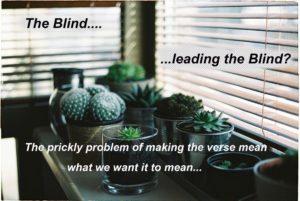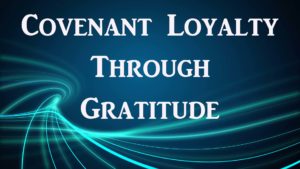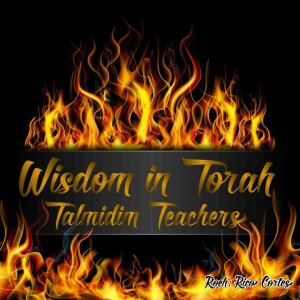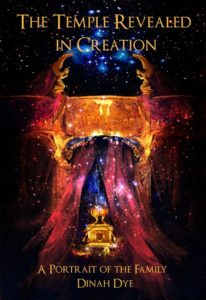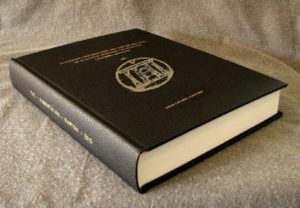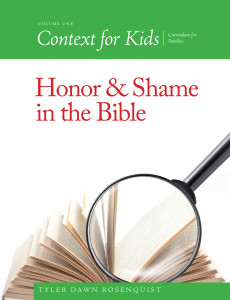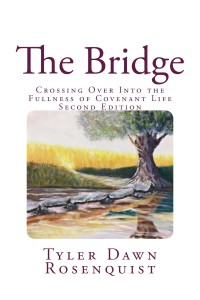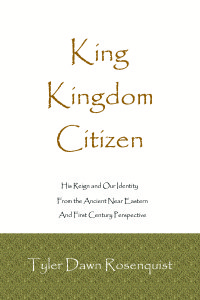Kids Left Behind: A Wake-up Call For Grown Ups
 Almost six months ago I wrote a blog explaining that I was partially transitioning to children’s ministry and this is the blog explaining that the transition is over–and I want to share with you a dream I had back in January that should be sobering for every parent, grandparent, and minister of the gospel.
Almost six months ago I wrote a blog explaining that I was partially transitioning to children’s ministry and this is the blog explaining that the transition is over–and I want to share with you a dream I had back in January that should be sobering for every parent, grandparent, and minister of the gospel.
The dream was jarring. I was at the home of a relative, one known for her good works fostering and adopting kids in crisis, which they undertook once their kids were grown. It’s important that you know this because I want everyone to see themselves in this dream, and not to think that these are the types of people who were somehow purposefully neglecting kids–these are the kinds of people that other people admire. Very few people reading this are going to measure up just to the baseline on this, myself included. And this dream isn’t about this relative–she was used because to me she represented this life of giving oneself in good works to kids.
I arrived at their house on a bicycle and pulled up in the driveway to see a big van for the entire family and also a cherry red classic 1967 mustang convertible. Now in real life, this family has never owned such a frivolous vehicle, but dreams often employ excessively liberal standards of creative license. I walked into the house and saw four children of various ages from about 8 to 15 and I had no impression whatsoever whether they were adopted, fostered, or biological so that didn’t play into what followed. At this point, the dream abruptly shifted and I was aware that I was traveling to a big family reunion, and in fact, all the adults were going and I saw nothing wrong with this.
At one point, however, I noticed it was getting dark and my bicycle was not equipped to operate in the darkness so I turned around and went back to my relative’s house. As I walked up to the house I noticed that the van was still there, but the Mustang was gone. I walked in the house, expecting to find no one–but the kids were all still there.
Not only were they there but they had been intentionally left behind–not out of callousness, but because no one had thought seriously about taking them. No one was coming back for them–there was food in the house, television, books, entertainment (even though in real life this family has no television and live very much the kind of life out in the country that many of my friends would consider ideal)–but these kids had been abandoned when the parents went off on their pilgrimage with other adults. The adults had made great preparations for their journey, but the kids were hardly an afterthought. The kids were left with everything they would need to survive, and enough to keep them busy.
One was absolutely heartbroken because he had desperately wanted to go with the adults. The others were simply resigned and accepting of having been abandoned.
I decided then and there to ditch my bike and take the kids in the van to where everyone else was going.
Suddenly, my husband came up alongside me. I said to him, “Everyone is already expecting you, you’re late.”
He turned to me and replied, “I’m not late. I am just not going to be there when they expect me. I am lingering for the children.”
I realized then that he had a big enough vehicle for everyone and that, more importantly, it was not really my husband to whom I was speaking. I have seen Messiah in my dreams many times, and I never know Him by sight–it isn’t until He speaks that I know Him.
********************
Are we preparing to go and meet Yeshua (Jesus) while leaving our kids behind? Are they nothing but an afterthought? Are we not “indoctrinating” them because we want them to be able to make their own faith decisions objectively? Do we think they are too young to learn to be discipled? Are we writing them off and hoping that Yeshua will come so quickly that it just won’t matter? Are we so impressed with the example we are setting that we presume they will simply follow us? Or are we just pounding the commandments into them without actively nurturing the fruit needed to sustain them in the lifestyle they are called to live? Did we even have any of the fruit ourselves to give them?
I guess we came by it honestly–many grew up with the attitude that as long as you read the Bible to your kids and take them to church, that’s it and you’ve done your duty. We teach them the commandments and think that we’ve done our jobs–although in all honesty, we ourselves are struggling since coming to the faith. We believe and teach the Bible as a list of do’s and don’ts that we often secretly resent. We aren’t doing a good enough job of raising our kids within a culture of faith where we are communicating clearly that it isn’t about “do and do not.” We aren’t telling them, “we have a culture where we do these things and don’t do these other things because God’s family behaves differently.” We present God’s culture as a laundry list of ultimatums, as though He is a dictator because that is how the Gentile nations do things and we never made the paradigm shift. We never impart the heart of why we live the way we do because most of us don’t even really have a clue. We spend more time talking about what other people are doing wrong than we do in celebrating this culture that we should be humbled to have been grafted into. Where is our gratitude? We have gone searching for knowledge, and we obsess with being “against” the world but we haven’t taught our kids (or learned ourselves) how to be “for” God’s culture without the ways of the world constantly being mentioned, disparaged, and thrown in their faces. We focus on how terrible the world is instead of directing our attention to how wonderful God’s ways are. No wonder our kids don’t get it–no one can live a life of being simply “against” without wallowing in negativity, bitterness, and contempt. To live a life of love, joy, peace, patience, kindness, goodness, faithfulness and self-control means that we need to be really positive!
We have stuffed our own heads with knowledge, teachings, and conspiracy theories that, in the end, do nothing to prepare our kids to be the generation who will fight the big battles. But what good is it if I know everything about the Bible, spend thousands on books and conferences if I am just keeping it to myself or blabbing about it on Facebook to other adults but don’t impart that information to my children? Did you think we were the generation who would be THE GENERATION? No way, we spend all our time acting like Lot’s wife, who I think had just taken a selfie of herself with the destruction and was turning around to say, “Ha! I told you so!” so that she could post it to Twitter (but I only say that because I believe that behavior never really changes). When we aren’t doing that, we are acting like the Israelites in the wilderness–wanting to stone our leaders, or assume leadership for ourselves like Korah, or do things our own way like Nadab and Abihu, or continually whine about Egypt like the mixed multitude.
You know, in the end, the only thing Moses’ generation was good for was to gird up their loins and buckle down to teach the generation who would end up going into the Land. Everyone twenty and older had been passed over because they were too self-absorbed–except for Joshua and Caleb (who everyone thinks they would be, everyone except me, anyway). We’re being passed over, and if, when I said that, you were more concerned with whether you are a Joshua or Caleb than you were with steeling yourself to make sure our kids aren’t passed over as well, then that is a problem. We’re too concerned with us, and not focused on the community, not even our kids.
It doesn’t matter if you or I are a Joshua or Caleb–I don’t deserve to be considered either, and I really don’t even care at this point. My concern is for those kids who got left behind. My passion is that they understand their Bibles and not just learn to accept, once they are adults, whatever nonsense is being taught out of context. I want them to understand the character that will be needed in order to be disciples and servants of our King. I don’t want them to be anything like we are. I want them to be focused on Biblical culture more and focused on being disgusted with the world a whole lot less. I want their focus to be ahead, and not behind–like our focus has tragically been. I don’t want them looking for reasons to hate and fear the world, I want them to discover the reasons for loving God and cherishing His ways. I want them to be like Moses, Daniel, and John. I don’t want them to be like us. They deserve to be Kingdom-minded, and forward-facing so that they can preach a pure gospel.
We never know how much time is allotted to us in this life. I am finishing up my second curriculum book this week and have nine more books I want to get written for kids and their families, and more videos I want to get made. I think we all need to stop fussing so much with the adults and all of our messed up priorities and character flaws and drama and distractions. If Yeshua is lingering for this generation, then I will be staying behind as well. They need to be ready, and I believe with all my heart that we will be needing to help them and then get the heck out of their way.
So check out my new blog www.contextforkids.com.
